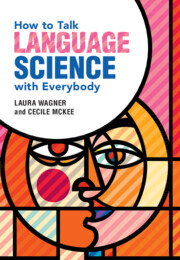Book contents
- How to Talk Language Science with Everybody
- How to Talk Language Science with Everybody
- Copyright page
- Contents
- Figures
- Preface
- Acknowledgments
- 1 Why Bother?
- 2 You Can Be the Expert
- 3 Cooperative Conversations
- 4 Conversational Goals
- 5 Know Your Audience
- 6 Creating Relevance by Generating Interest
- 7 Creating Relevance by Making Connections
- 8 Quality and Credibility
- 9 Quality vs Quantity
- 10 Learn to Listen
- 11 Information Structure
- 12 The Curse of Knowledge
- 13 Start with Examples
- 14 What’s New?
- 15 From Given to New
- 16 The Three-Legged Stool Approach
- 17 Working with a Range of Different Audiences
- 18 Where Can I Go?
- 19 Being a Good Partner
- 20 Finale
- Appendix Teaching with This Book
- References
- Index
4 - Conversational Goals
Published online by Cambridge University Press: 17 May 2023
- How to Talk Language Science with Everybody
- How to Talk Language Science with Everybody
- Copyright page
- Contents
- Figures
- Preface
- Acknowledgments
- 1 Why Bother?
- 2 You Can Be the Expert
- 3 Cooperative Conversations
- 4 Conversational Goals
- 5 Know Your Audience
- 6 Creating Relevance by Generating Interest
- 7 Creating Relevance by Making Connections
- 8 Quality and Credibility
- 9 Quality vs Quantity
- 10 Learn to Listen
- 11 Information Structure
- 12 The Curse of Knowledge
- 13 Start with Examples
- 14 What’s New?
- 15 From Given to New
- 16 The Three-Legged Stool Approach
- 17 Working with a Range of Different Audiences
- 18 Where Can I Go?
- 19 Being a Good Partner
- 20 Finale
- Appendix Teaching with This Book
- References
- Index
Summary
Chapter 4 opens by asking readers to compare learning in formal and free-choice situations. This proceeds to a core goal of conversations for public engagement, which is to make our exchanges interesting enough that people want to talk with us. This chapter compares two approaches to teaching and learning: A deficit model approach assumes that the learner is in some sense empty or flawed, while the funds of knowledge approach assumes that the learner has a rich base of relevant prior knowledge. The latter approach is encouraged so that a science demonstration begins by probing an audience’s interests and then using that as a hook and an organizing principle. Six strands of science learning are introduced, with emphasis on the strand referring to a learner’s interest and excitement. Practical considerations include recognizing that no single science demonstration is likely to hit all strands equally well. The Worked Example shows this with detailed comments on a demonstration of language lateralization. Because public engagement often occurs in free-choice situations, getting and keeping an audience’s interest is critical.
Keywords
- Type
- Chapter
- Information
- How to Talk Language Science with Everybody , pp. 38 - 52Publisher: Cambridge University PressPrint publication year: 2023

